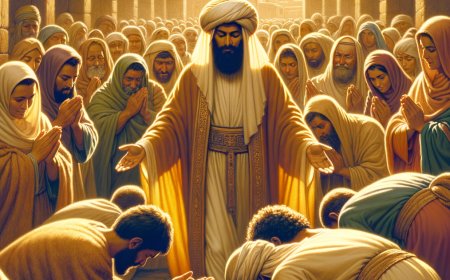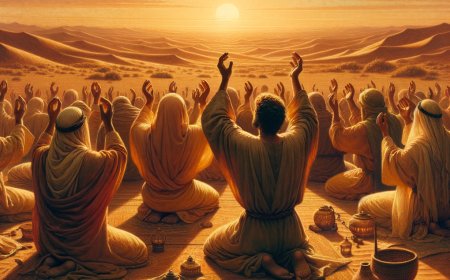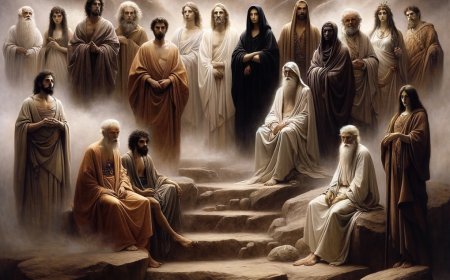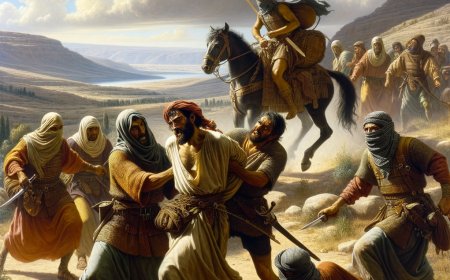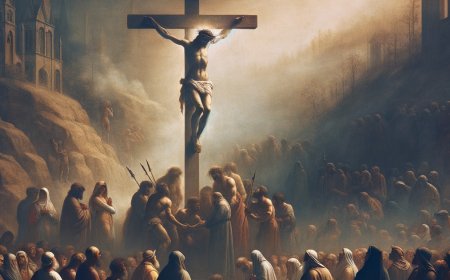No Tithing: In the Age of Grace
The truth being, there are no more carnal offerings that God will except. The truth being that Jesus is the ONE TIME high priest and we only have to offer to him one time, and that being our bodies. The truth being, under the divine covenant of grace, offering to God is as simple as this: tithe once and give all.

Tithing in the age of Grace searches each phase of tithing throughout the bible. As the giving of a tenth to Melchezedek by Abraham, as an inheritance to the tribe of Levi during the period of the Law, these two theories cover the Old Testament. The coming of Christ and his standpoint on tithing, the early church and their methods of receiving money, up unto today's church and in what ways it practices tithing.
The book of Hebrews thoroughly covers the first two stages of tithing, which will be studied in the first portion of this study. The second portion of this study will examine Christ's stand on tithing along with other relevant scriptures in the New Testament. By the end of the composition, the reader should be able to endorse his or her own judgment in the matter. By testimony of the word itself and through the inward unction of the teaching of the Spirit of Truth, (the Holy Ghost); to discern whether or not the church of Jesus Christ should be tithing in the age of Grace.
Chapters 6-11 of the book of Hebrews cover the theory of Christ being the high priest of God forever after the order of Melchisedec. Within a thorough analysis of the theory, there is a divine enlightenment concerning the duty of tithing as it pertains to the followers of Christ. In order to unfold the revelation, we will follow each passage and precept beginning with chapter 6, verse 1 of Hebrews. (In order to preserve space and for the reader to get full confirmation of this study, the author asks that the reader have the Word of God opened to the selected text).
In chapter 6:1-3, the writer of Hebrews admonishes the saints to leave the principles of the doctrine of Christ and go on unto perfection. "And this will we do, if God permit." verse three. There are levels of growth within the walk of the gospel and in order to leave the principles of the doctrine of Christ, the beginning level, one has to first be rooted in the doctrine. Having understanding of each of the above basics of the doctrine; repentance, faith in God, baptisms, spiritual gifts, the resurrection of the dead and of the judgment, the saint can then grow into the perfecting stage of the gospel.
Once a believer is rooted in the doctrine, they cannot be uprooted or led astray after the Lord directs them into their calling, to perform Gods will for them in their life. The beginning phase (the one of grounding), is to mold the believer for the work in which God has called them, and this is the central meaning for the first 3 verses in chapter 6. An understanding of this message will be needed, and referred back to, as we go further into this search.
Verses 4-8, in its revealed meaning, simply admonishes the believer of the consequences to reap if one never advances from the basics if the doctrine of Christ in order to go on unto perfection. They fail to bring forth a harvest of the gospel and is nigh unto cursing, because they have crucified Christ in their refusal to enter into the perfecting phase of the gospel; moreover, they never fulfill the will of God for them in their lives. Verses 9-12 encourage the believer to continue on in the gospel through faith and patience in order to obtain the promises of God.
With this basic foundation laid by the first 12 verses of chapter 6, we hope that the reader has found himself to be rooted in the gospel and ready to go on unto perfection. In order to obtain perfection, the believer must be ready to remove from them, any burdens of the Law and press forward into the true gospel, which comes only by faith and grace in Christ. The following passages and precepts of the next five chapters will confirm this advancement.
In verses 13-17, it can be confirmed that the scriptures resort back to the promise made by God to Abraham, in which God blessed and multiplied him. God confirmed it by an oath, seeing there was no higher authority to swear by, thus establishing the fact that all of the heirs after Abraham would also inherit the blessing. Verses 18-20 holds that it is impossible for God to lie which give the heirs of the promise all the more reason to pursue the promise, especially if the forerunner, (Jesus Christ), has paved the way for us, "made high priest for ever after the order of Melchisedec." verse 20.
In conclusion of chapter 6, we have established the fact that a believer must, at some point in their walk of the gospel, leave off the principles and move on unto perfection. There is a clear distinction here that there is more than one phase of understanding God, if one does not advance from the beginning level then there would be no way for them to appreciate the next level, not to mention it being difficult to understand.
The scriptures encourage the believer to follow after the promises of God as an heir of the blessing to Abraham - made without a doubt by God and under the influence of our Lord and Savior Jesus Christ - who went before us into the veil as an high priest making intercession for our sins. With this in agreement we will continue on.
Chapter 7, verses 1-4, renders a complete explanation of the role of Melchisedec who received an offering from Abraham, a tenth of the spoils he [Abraham] acquired after destroying the kings who had taken his nephew captive. According to scripture, Melchisedec was considered the high priest of God, made like unto the Son of God, and initiated the deed of tithing as it first appeared in scripture. It represented honoring God with the first fruits of any goods gained by anyone due to instruction and assistance from God.
The incident involving Melchisedec and Abraham represented the proposed plan for the heirs of Abraham - the twelve tribes of Israel and all those who pursue the promises of God - to honor God with the first fruits of anything material obtained by the heir and as a result of instruction or assistance from God. As we continue on in the search, we must remember that the incident between the two, Melchisedec and Abraham first set the foundation for the bases of the Levitical priesthood made under the Law.
"And verily they that are of the sons of Levi, who receive the office of the priesthood, have a commandment to take tithes of the people according to the law, that is, of their brethren, though they come out of the loins of Abraham." verse 5.
As far as being made like unto the Son of God, verse six explains how, although Melchisedec did not come from the loins of Abraham since he existed before Abraham, he received tithes from Abraham and was inspired by God to bless him. Thus, establishing Melchisedec's authority with God, moreover, revealing the omnipotence of God by implementing the fact that Melchisedec was God. This, afterward, formed the foundation of the following dispensation as it pertains to offering to God. Verse seven simply forms a law of nature not to be disputed.
Verse eight distinguishes mortality from immortality along with a clear establishing of carnality from spirituality, an understanding which will be needed in order to fully understand the principles involving tithing under the age of grace. The differences must be understood because as we continue on, the scriptures will reveal that the law is carnal but grace is spiritual.
The Levite died under the law while practicing carnal ordinances and all under grace worship continually by the power of an endless life; therefore, anything carnal has no part within the realm of spirituality or immortality. Verse nine, 10 reveal the fact that the law was being established, (particularly the law of tithing), before Levi was even born; nevertheless, it was counted as in effect when Abraham gave a tenth to Melchisedec.
Verse 11 is interpreted thus; there would have been no need for Jesus to die on the cross in order to bring the saints to perfection if the Levitical priesthood established perfection, or from under the law. If, on the other hand, perfection did come by the law, then we all, unto this day, would be called to be priest the same way Aaron was a priest.
Verse 12, (and this is an imperative thought), clearly state that there must be a change in the law - which involved tithing - if there is a change in the priesthood. The fact that Jesus is now the high priest after the order of Melchisedec means that tithing, under the law of ordinances, is of no effect in the age of grace. But, to further prove this theory, we will continue on with our analysis.
Verses 13-23 are actually self-explanatory and self-evident. First of all, it proves that Jesus came not only to fulfill the law, but, in many instances to disannul the law. Because the law could make any one perfect - and perfection is the purpose of his coming in the making of disciples and followers - the law proved to be unprofitable by reason of death. The Levitical priesthood had to be passed down generation after generation because it was a carnal priesthood.
But now that Jesus is the high priest after the order of Melchisedec, who has the power of an endless life, the priesthood is established eternally and does not require carnal offerings and sacrifices. These verses also verify the fact that Jesus was not even born into the tribe of Levi but into the tribe of Judah, therefore, he was not chronologically authorized by the law to take the office of a priest. Furthermore, with an oath, Jesus was made the high priest by God, unlike Melchisedec and the Levitical priest, and this oath was to establish perfection, and not by the written law, but by the New Testament which is justified by spirituality not carnality, or carnal ordinances.
Verses 24-28 confirms the fact that Jesus has an unchangeable priesthood which is unlike the Levitical priesthood because the Levitical priest possessed infirmities that needed supplementing by way of daily sacrifices, first for their own individual sins, and then for the sins of the people.
They had to come to the altar each day and offer sacrifice in exchange for the forgiveness of the sins they committed each day. But Jesus, who offered himself one time for the sins of everyone committed from here on out, and does not require different high priest to offer daily, is surly a better testament of salvation, confirmed by an oath from God.
During the next three chapters we will focus on selected verses, and we will confirm the ideas by way of passages related to the ideas. For instance, verse two of chapter 8 reveal that the priesthood of Christ was established by God and not by man. It did not require man made rituals for the sanctuary and tabernacle, but the attendance upon these was now spiritual and not carnal, or physical.
For the remaining precepts of chapter 8, the ideas can be interpreted by explaining the following scripture: "Think not that I am come to destroy the law, or the prophets: I am not come to destroy, but to fulfill" (St. Matthew 5:17).
The law that was given to the children of Israel includes the following: The Ten Commandments, the ordinances of attendance upon the alter and the sanctuary, (which consisted of offering the blood of dead animals by the priest for the sins of the people), and the order of the Levitical priesthood as it pertained to the law of tithing - enforced for the stability of the nation and the economic good of the tribe of Levi. Each tribe in the nation of Israel was given an inheritance according to the promise made by God to their founding father Abraham.
The promise was that of a new land, one flowing with milk and honey, that the nation of Israel was to possess after they succeeded out of the wilderness from following Moses. All the tribes received a portion of the new land. Some receive portions of the land that was not across the river Jordan, nevertheless, they received the promise. But the tribe of Levi did not receive land as their inheritance, instead, they received the office of the high priest and were instructed to take tithes of the people in order to sustain them physically, and to intercede for the people's sins by attending to the alter.
Then there were many other added ordinances, such as, laws of property; laws of ethical and judicial behavior; laws and ordinances for rituals of diet, family, worship, and much more; and all these rules and regulations - in which the children of Abraham were to follow - were considered, the law. These laws were to be taught to and lived by every citizen of the nation without any help from a comforter, (which the believers of today have the privilege of possessing). For the record, any soul who does not possess the comforter (Holy Ghost), in this age of grace, are still bound to and will be judged by, the laws of the Old Testament.
God knew that man needed this extra help in keeping the law, the most difficult being the Ten Commandments. So, he sent forth the Spirit of his Son to live in man, or whoever received his Son, in order for the law to be lived and fulfilled in whoever received the Spirit. Thus, in verses 10-13 the Lord announces a new covenant, a New Testament, under a new and everlasting priesthood. One that there will be no need to obey carnal ordinances and rituals for the sacrificing of sins because he will totally wash away all sins and remember them no more using only one sacrifice; his only begotten Son, Jesus Christ, who taketh away the sins of the world. Then in verse 13 he states: "A new covenant, he hath made the first old. Now that which decayeth and waxen old is ready to vanish away."
God enforced this new covenant because he desired for his people to be perfect, and since the law made no one perfect because of the infirmities of the flesh, he sent forth his Son, in the likeness of sinful flesh, to overcome the sins and disobedience of the flesh. The children of Israel walked in the flesh; they worshipped God in the flesh, and they died in the flesh. They will also be judged by the law, based on whether or not they kept the law as directed by Moses and upheld by the high priest.
But, when God decided to have mercy on humanity, because he loved us so, he reformed the covenant in order to help our infirmities. This is when he sent forth his Son so that whoever believed in him might overcome the flesh, and death, and live eternally; and this is called the Grace of God. Therefore, he did not destroy the law but fulfilled it with one that would prevail over all written law: "Love worketh no ill to his neighbor: therefore love is the fulfilling of the law," (Romans 13:10). And this is all he requires from a believer when it pertains to salvation - love.
Chapter 9 verse 1 of Hebrews describes the first covenant as having a worldly sanctuary. This means that all the ordinances and rituals of worship services were fleshly and physical. Verse 2-7 details all of the physical characteristics of the tabernacle along with the priests' daily services in relation to the offerings for sins. Verses 8-10 probes deeper into the symbolic meaning of the services. These were not yet made manifest but were only a type of forethought as to what was to come. Revealing the fact that these carnal services were only practiced until the time of the reformation, or changing of the covenant, which would then make the believer perfect as pertaining to the conscience.
The consciences' of the children of Israel were least effected by all the ordinances and attempts to keep the law. The priest offered for their sins in fleshly means thus only justified their sins in the flesh, and not in heart or mind. This aspect of perfection must be remembered as we continue on, that, under the inspiration of grace, the spirit and interceding power of Christ is to perfect the mind, soul, spirit, and flesh, and not just the flesh only, as the ordinances or the law did.
The remaining of chapter 9 expounds on the ordinances of offering blood upon the altar for the remission of sins. The children of Israel offered the blood of dead animals as a sacrifice for the forgiveness of their sins. The high priest could not go in unto the tabernacle without the offering of the blood of an animal; this is the carnality of the law.
The believers today do not have to offer the blood of a dead animal for their sins every day because that is what Christ did when he offered himself for the sins of the whole world. Not only was he an offering for our sins but he died just as the high priest died and past on the priesthood to the next generation, yet Christ rose from the dead, (something they could not do), to give eternal life to anyone who believed he rose. Christ entered, not just into the physical tabernacle, or holiest of all made with hands, but he died and entered into the presence of God himself, in order to make intercession for the sins of those who believe.
Chapter 10 verses 1-3 state that, the yearly sacrifices - which were carnal - can never make a believer perfect (another thought to be remembered once we reach our point in discussion) "for then would they not ceased to be offered?" verse 2. We would still be offering sacrifices each day and year in order to cleanse us of our sins, yet our consciences would never be clean, due to the carnality of the services; therefore, we, and God, would always remember our sins within the guilt of our consciences'. But God promised, and confirmed it by an oath, that he would not remember our sins no more.
Verse 5 is an essential part of this lesson; it provides a root to our theory once we prove that nothing is more important, or even honored by God, than the body itself (which includes the heart, soul, and mind).
All burnt offerings or any kind of sacrifices we give unto God, especially those of material value, cannot take the place of your willingness to be a living vessel for his use. Verses 6-14 establish this truth, and also verify the fact that the one offering of Jesus upon the cross replaced those sacrifices and offerings. He offered himself ONE TIME for the world. There is nothing else that can be given upon the altar as a sacrifice ordered under any commandment that was not covered by the offering of Jesus Christ; therefore, any ordinance carried over from the law has no effect or honor with God. For, all these carnal commandments were disannulled by grace.
Verses 19-25 exhorts all believers under grace to take advantage of this period of grace and be not entangled with the laws of ordinances. There is a new way in which we are forgiven and accepted by God. Not through carnal ordinances and offerings, or through the intercession of any high priest but one. He does not require the blood of goats and bulls, and since he is not from the tribe of Levi, neither does he require a portion of your tithes. We are no longer under those aspects of the law, even though Christ is made high priest after the order of Melchisedec. Abraham gave Melchisedec an offering only one time.
It was recorded only once that he gave him a tenth, therefore, if Jesus died once for us then we are required to offer unto Jesus one time, and that not of a tenth, but of all that we own; chiefly, our whole body, which is our reasonable service. The scripture exhorts us to hold fast to our faith in the everlasting covenant and not in the old; having our bodies, hearts and minds washed with pure water, the water that cleanses us from our sins forever, not just for the year.
Verses 26-39 of Hebrews chapter 10 is in relation to the start of our booklet, at the beginning of chapter 6 of Hebrews. It draws on chapter 6 by reminding the believer that, if a soul does not advance to the point of perfection (which calls for a certain knowledge of the principles of grace), then certain hindrances begin to occur in their growth. It emphasizes that there are no more sacrifices remaining for our sins if we fail to come to the obedience of the gospel as it relates to perfection.
If a believer counts the blood offering of the new covenant as an unholy thing, or as something offered in vain, then that soul will draw the vengeance of God upon them. In order to fulfill obedience under grace one must have faith in the covenant, and not in carnal offerings and ordinances. In order to be justified by faith through grace, one must disregard any suppositions that anything offered to God in the form of material substance has no meaning with God; it is the body only that God will honor.
"Now the just shall live by faith:" verse 38. We must have faith in the new covenant, not in divers washings and meat and drink offerings that were a part of the law. We must see Jesus as the high priest of the new covenant, not our pastors or earthly sanctuaries. We must not trust in earthly riches or man-made traditions and ordinances of worship, but the true worshippers will worship God in Spirit and in truth.
The truth being, there are no more carnal offerings that God will except. The truth being that Jesus is the ONE TIME high priest and we only have to offer to him one time, and that being our bodies. The truth being, under the divine covenant of grace, offering to God is as simple as this: tithe once and give all.




















